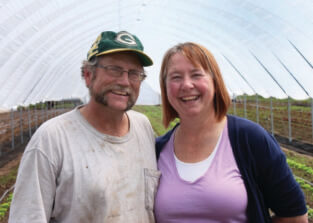Sneak Peek: Vegetable Pricing and Philosophy, In-Field Practices for Organic Vegetable Production
Our hard-working communications specialist Tamsyn Jones worked right up to the birth of her baby. Part of that work entailed getting quotes from Kay Jensen and Paul Ehrhardt in preparation to do a ‘vegetable-centric’ conference press release. Baby Jones Witte arrived before the press release was written, but she did get some great quotes!
Kay Jensen and Paul Ehrhardt run JenEhr Farm on 110 acres of certified organic prairie farmland near Sun Prairie, Wisconsin. They are presenting sessions In-Field Practices for Organic Vegetable Production and Don’t Give it Away! Vegetable Pricing and Philosophy this Saturday during our conference. Kay is also going to talk about her financial decision-making process and sharing financials with trusted peers during the Friday afternoon session, Cards on the Table: Putting Farm Financial Statements in Context.
Here is a sneak peek of the perspectives they will share at the conference:
What sort of management practices are necessary to manage such a diversity of fruits and vegetables as you do — and on such a bigger scale?
My grandpa always said, little kids little problems; big kids big problems. The same philosophy applies as your farm grows. The issues become much more complex with more moving pieces, so we needed to move from management practices that were focused on either Paul or myself just doing the job, to a management style resulting in less hands-on, brute force solutions to more cerebral, planned solutions, including more systems. We can’t manage the larger farm by the seat of our pants anymore.
What are some key tips you’d give to other horticulture farmers who aspire to scale up to the level you’re at? Is being diversified important to this?
We think that diversity is the key to our success (that definition of success is completely arbitrary and dependent on the day); diversity not in just what we grow, but how we market what we grow. For example, including pastured chickens in our operation contributes not just to product and marketing diversity, but allows us to better utilize our rotations and fallow periods. Scaling up is really about what you can manage, not so much what size you want to become. At JenEhr, Farmer Paul feels that he is at his maximum ability to manage the crew, equipment and the land. It’s a fulcrum balancing act, sometimes you don’t realize your limits until you’ve gone too far, then you need to have the courage and wisdom to back up/reduce instead of steamrolling forward.
What are some of the considerations or trade-offs you have to factor in when seeking to find a fair price for your products? Do you try to factor in both your labor as well as consumer willingness to pay?
A fair price is one that allows us to operate the farm at a profit. We are not willing to put in this much work and not be fairly compensated. Our time, expertise and brute force have a value, one that we calculate into our pricing structure. I’m not interested in selling to customers always looking for a bargain, I’m interested in creating a relationship with our customers who value the nutritional, flavor and sustainable elements of the food we grow for them. I too have children to send to college, property taxes to pay and a retirement for which to plan – if the farm doesn’t pay for those things including a fair standard of living, then it’s not really sustainable and we should be using our talents elsewhere.
The third year in operation, we sat down and drew a line in the sand – If we did not net a certain dollar amount, then we needed to quit farming. No juggling the books, no hanky panky with the numbers, not what the tax return said but bottom line dollars. When we drew that line, it caused us to really focus on creating a sustainable and profitable operation, getting rid of unprofitable enterprises and enhancing things that grew best with our soil and our human talents and interests.

